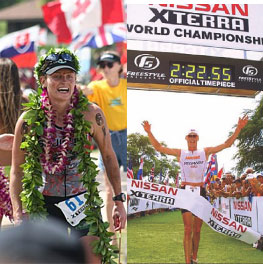
LA Tri Club presents Conrad Stoltz & Melanie McQuaid
Following the LA Tri Club's tradition of bringing the greatest personalities in triathlon to the center stage to regale the LA Triathlon community with tales of training, racing, and triathlon life, we are pleased to announce an Evening with XTERRA 3x World Champions - Conrad Stoltz and Melanie McQuaid. LA Tri Club meetings are open to all! Ticket information for members & non-members is below.
WHEN : Tuesday, May 13 - Doors open at 6:00 p.m.
DETAILS: Ticket price includes entry to the Expo, a buffet Dinner and
presentation by guest speakers: Conrad Stoltz &
Melanie McQuaid!
WHERE: The Proud Bird: 11022 Aviation Blvd., L.A. 90045. Near LAX. Free Parking.
MEMBER TICKETS: Here - In our RSVP/Polls
NON-MEMBER TICKETS: (WWW.ACTIVE.COM)
http://www.active.com/event_detail.cfm?event_id=1571086

April 1st, 2008
1. Nutrition and hydration for long distance runs is extremely overrated. In fact, they suggest that 8 oz of water is enough to last a typical human being for 8 hours of non-stop exercise. They rule of thumb, they suggest, is 1 oz of liquid every hour.
2. Scientists also discovered that the act of actually "running" isn't really necessary to become a good runner. They suggest that all one needs to do is close their eyes and mentally visualize themselves running. By using this scientifically proven "power of the mind" exercise, the subjects in their study were able to increase the mitochondrial density of their muscle cells, hence increasing oxygen consumption and metabolite breakdown, all of which made them not just powerful runners, but also great cyclists and swimmers.
3. The study suggested that most running injuries occur because people mentally imagine them becoming injured. There is absolutely NO physical evidence that overtraining will lead to an injury. All one needs to do is to have enough confidence and courage to know that they are immune to running injuries and they will NEVER have to deal with a running injury ever again. This applies to both beginner and advance runners, but researchers suggested that because beginners have more self-doubt about running, they are more prone to injuries.
4. Study showed that running is hazardous to your health. Aerobic exercise in general can cause hypertension, diabetes, strokes, cardiovascular illnesses, cancer, and on rare occasions, it might infect you with HIV.
5. Contrary to the popular belief, scientists suggest that hiking isn't for people who are too lazy to run anymore.
6. Smoking cigarettes is all of a sudden good for your health.
7. Stretching is a waste of time. From this point on, don't EVER bother stretching ever again.
8. Researchers find that drinking a triple-shot espresso seconds before a marathon start will guarantee a marathon finish in under 3 hours.
9. One hour of bowling (yes, it's a sport, look it up) burns as much calories as two hours of running.
10. Scientists proved that running is NOT addicting and catching the "runner's bug" isn't an acronym for a euphoric feeling felt by people who frequently run. In fact, the runner's bug is an actual disease causing virus with symptoms ranging from nausea, diarrhea, dizziness, and in 100% of men, impotence.
There you have it folks, shocking but true!!!
By: Arkady Hagopian

17 THINGS THAT TRIATHLON HAS TAUGHT ME ABOUT LIFE
17 THINGS THAT TRIATHLON HAS TAUGHT ME ABOUT LIFE
1. There are good days and there are bad days and sometimes you can't tell the difference until you start.
2. Contrary to popular belief, sleep is not overrated. Not in the slightest.
3. Don't forget to breathe.
4. Just because it's raining doesn't mean you should cry.
5. Nobody ever said it was easy.
6. Pain is temporary. Pride lasts a lifetime. Sometimes even two.
7. Create a plan and stick to it. It may not always work, but if you stay focused and relaxed, it'll all end up just fine.
8. You've got to try. No matter what happens in the end, you'll have bigger regrets from not ever trying.
9. Strength and courage blossom from the sands of adversity.
10. Sometimes it’s the little things that make the big differences
11. Getting to the starting line is usually a lot harder than getting to the finish.
12. Listen to your body and listen to your mind. And make sure you know when they're lying to you.
13. You can't change the past and you won't alter the future. Enjoy right now, right now.
14. Smile - it does a body good.
15. Be supportive of others. We're all in this together.
16. It's OK to cry.
17. Don't forget to eat. Especially breakfast - that's a really important one.
Jeff Matlow
More at http://IronmanLife.blogspot.com

HI, MAINTENANCE.
Remember when we knew nothing about heart rate training, cadence, stroke count and such nonsense? When going for a run meant going for a run, and had nothing to do with intervals or tempo or taper? Do you remember those days? I don't. I've got no memory of them anymore than I can recall an existence before TiVo or e-mail.
Since I got quote-unquote serious about this whole triathlon lifestyle malarkey, my life has been a series of non-stop measurements. Heart rate this, lactate that, aerobic, anaerobic, VO2 max and glycogen stores. Truth be told, I don't even know what a glycogen store is or where I'd go to find one.
Whatever it is, I'm sure it needs to be measured and monitored and scrutinized, because that's what we do in triathlon. We take one step forward, then study it from all angles in all ways to determine if we can take a more efficient step in a more effective way to bridge that gap of three feet in one trillionth of a second faster.
Maybe if I had lighter shoes or more wind resistant shorts. Perhaps if I lost a little weight or invested in some plastic surgery to make my body more closely resemble one of those swanky Cervelo frames. Maybe that'll help.
After all, over the course of 140.6 miles, that one trillionth of a second adds up to a whole bunch of one trillionths. And maybe that's the difference between finishing in 1028th place and 1029th.
In the realm of life experiences, apparently that's really important to people like me. Though when I read this I can't quite figure out a reason why. In fact, it makes me sound like a bit of a boob.
I probably even begin to come across as a stereotypical Type A personality. But I swear to you, I'm Type B. Type B, I say! I was born low-maintenance and laid back and, dagnabbit, that's how I'll continue to live my life even if I have to make endless lists to remind myself.
Sure, somewhere along the way I replaced my unstructured workouts for a regimented training program. And, yes, perhaps I do know the exact number of granules of powdered potion I need to ingest every hour in order to maximize my endurance. Is that so wrong? Hey, at least I don't keep a continuous daily log of every detail of every workout. Actually, I take that back.
OK, maybe I am a bit controlling, but I reckon that's par for the course. Because whether we want to admit it or not, triathlon is all about structure. It is a sport customized for us folks who like a bit of controlled behavior in our lives.
Maybe you start off as the laid back Type B-er that I once claimed to be, but once you finish your first sprint distance race and then decide to tackle an Olympic distance, soon you'll be training for a 70.3, and then…
Next thing you know you're running deeper into the rabbit hole of multi-sport where the amount of regimented activity is directly proportional to the number of kilometers in your next race.
Us triathletes, we love our structure. We love to continually try to shimmy our Type B personalities into a Type A hole. With a racing and training season that can last most of the year, we have learned to become one with our sports addiction. We don't just race triathlons, we are triathletes. It is our identity. We are engulfed in a triathlon life.
Yet with this demanding lifestyle, we can easily teeter on the edge of Obsessive Compulsive Training Disorder. The pressures of living a balanced life can get overwhelming and so it is up to each of us to set our own personal limits. Like Don Henley told us many years ago, this could be heaven or this could be hell…we are all just prisoners here of our own device.
So with the hopes of avoiding the inevitable self-destruction, we must admit that there comes a moment in life when every triathlete has to realize that enough's enough. No matter how hard you focus, there comes a point in time when there cannot possibly be any more Type A to squeeze out of the proverbial tube of triathlon toothpaste.
I like to call that time "the off-season."
Unfortunately for many passionate triathletes, the off-season is oftentimes easier said than done. While we are out on a five hour mid-winter tempo ride, we talk about how great it is to finally relax, yet somehow completely miss the irony of the situation.
So here we are, having just closed the books on another wonderfully eventful year packed to the gills with the stress and self-induced pressure of the triathlon training lifestyle. We're just a Super Bowl bucket of hot wings away from planning out a new racing season.
Our Type A is rarin' to go, to breeze through the off-season like its transition training. But I'm here to remind you that it's not that time yet. We've got to step away from the circus mirror and take a more realistic look at relaxation.
We need to remember that it is just as important to let the mind recover as it is to let the body recover. While in the off-season, let's try not to work ourselves into a tizzy over tweaking this and rejiggering that. The off-season is about refreshing and reinvigorating. It's about taking time "off". Which is probably why they call it the off-season.
I'm not saying to avoid the bike, run or swim at all costs, I'm just suggesting that it might do the body good to relax a little. Maybe even stuff that daily workout log into the back of the bedside drawer.
If you wake up in the morning and don't feel like exercising at all, why not take a break. Do some yoga. Play with the kids. Go for a walk. Have a chocolate glazed donut if you really want. See if I care.
Feel nervous that a weekend on the ski slopes might ruin your hopes of getting a PR in next season's big race? Last one to the lift line is a rotten egg.
As committed triathletes, we are living a triathlon life, yet what better time than the off-season to remember that this "triathlon life" encompasses two worlds in its two words. There's "triathlon," and trust me, we all will have more than enough time to do that again this year. But there is also "life." During the off-season maybe we should try to channel our energy toward the pleasures of life.
So hows about we put the VO2 maxed tri-addict aside for a little bit and embrace the Type B personality we once had back when Thursday nights actually meant something on TV. Soon enough, we'll all be shopping for lactate at the Glycogen Store anyway. ###
Jeff Matlow is the owner of imATHLETE.com

The Race from Head to Heart
The best athletes embody the virtue of non-competition. Not that they don't love to compete, but they do it in the spirit of play. - Lao-tzu
You race triathlons. You RACE triathlons. Why do you do it? Do you do it for the love of the sport or do you do it because you have something to prove? It is important to thoughtfully examine your motivations when gearing up for your season. What defines success in a race? In any race there are hundreds, if not thousands of other racers on the course, and there is also the clock. Are these the determinants of success? If you do not finish in a certain time or in a certain place, have you failed? If your definition of success or failure depends on external circumstances, then you have already lost. Success is not waiting at an arbitrary line 15 or 30 or 70.3 or 140.6 miles away; success is inside of you and depends entirely on your point of view. By understanding the factors that make every triathlete a champion you can make every race a success. From there, the only journey ahead is the journey from your head to your heart.
When I first got into this sport, I became obsessed with times and stats and placings and rankings very quickly. I competed in my first half Ironman in Oceanside last year and crossed the finish line filled with joy. My attitude changed the second I was told of the tiny margin by which I missed qualifying for the World Championships. My entire outlook on the day was thrashed. What had changed? My definition of success had changed. I could no longer enjoy the spirit of competition or living in the moment; success now hinged on achieving some external, superficial recognition. I stopped living in the moment and thereby turned what had been a success into a failure.
What happens when the race just doesn't go your way? That is where we get to dig deeper and find the best part of ourselves. Wendy Ingraham, Ironman champion, used those experiences in her career to grow as an athlete, and a person. "Several times I have set out in an Ironman and the pace just did not show up at the starting line. Rather than calling it a day or ' saving the race for another day', I like to pay it forward that day. I give my passion to another racer to help make their day." The ability to adapt and find passion in adverse situations is one quality of a truly successful triathlete.
So what qualities must all triathletes possess for success? Organization, patience and consistency are some of the watchwords that come to mind when speaking about a successful triathlete. Above all, though, is passion. An average triathlete with passion for the sport will outperform a gifted one without passion. The successful triathlete is the one whose ordinary moments are filled with passion. Every stroke in the pool or turn of the cranks must be performed with passion. Bring passion into your ordinary moments and maybe they won't seem so ordinary. If finishing a Half Ironman in five hours or less is your goal, you are opening yourself up to the possibility of failure. Is your achievement any less for finishing in 5:01? If you truly find passion in every stroke, in every second on the bike, with every step, you will be a winner without even looking at the clock. It is the person whose thoughts, goals and actions are all squared up that is the winner. By living in the moment throughout the entire race, you will enjoy a series of moments, regardless of the outcome. This is what you trained for; the race is the time to enjoy it.
Ingraham, always known for her smile and boundless enthusiasm on the course, sums it up this way: "By giving your passion and energy to another racer, you are guaranteed to make a new friend. In the end, it will make your day filled with passion."
The finish line is just a piece of tape that will be there waiting for us. Success is not at that finish line; it is inside of each of us.

LA Tri Club intervewied for Slowtwitch.com

LA Tri Club
Written by: Herbert Krabel
Date: Fri Dec 07 2007
With global domination in mind, the LA Tri club has grown quite nicely over the last few years. We talked to their president Paul Hekimian.
ST: Paul, how old and how large is the LA Tri club?
Paul: The LA Tri Club is going on its 8th year. We have grown to ~1,500 members and continue to grow steadily, and will continue to do so until we reach global domination. ?
ST: Do you consider the LA Tri club primarily a racing club?
Paul: No, that’s only part of what we are about. Our mantra is "swim. bike. run. play." The play means that we put a strong emphasis on the social side.... FOR MORE VISIT SLOWTWITCH.COM



